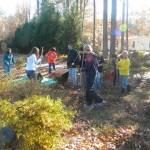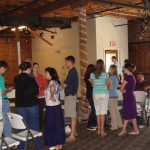A Day I Saw Jesus
This post is part of the January 2011 synchroblog on the topic “The Manifestation of God.” Now, when I first read about this synchroblog – and the fact that it would fall around the celebration of the Ephiphany – I again thought about not participating.
As most of my readers know, I did not grow up in a liturgical tradition. I mean, obviously, we had our “liturgy,” but it didn’t follow the traditional Christian calendar.
Then, I thought more about the description of this synchroblog topic:
This month’s synchroblog’s theme is inspired by the season of Epiphany which begins on January 6 and ends the day before Ash Wednesday. The word “epiphany” is rich in meaning. Epiphany is derived from the Greek epiphaneia and means manifestation, shining forth, revelation, or appearance. In a religious context, the term describes the appearance of an invisible divine being in a visible form. It can also indicate a sudden realization or comprehension of the (larger) essence or meaning of something. An “epiphany” might refer to those times in life when something becomes manifest, a deep realization, a sudden recognition that changes one’s view of themselves or their social condition and often sparks a reversal or change of heart. In the spirit of Epiphany we invite you to share stories, experiences and/or thoughts about “The Manifestation of God.”
I realized that while I did not celebrate “the season of Ephiphany” annually, the idea of epiphany is central to my understanding of who I am in Jesus Christ.
In fact, it all goes back to Jesus’ statement to Peter upon Peter’s confession that Jesus was “the Christ, the Son of the living God.” Jesus said, “Blessed are you, Simon Bar-Jonah! For flesh and blood has not revealed this to you, but my Father who is in heaven.” (Matthew 16:17 ESV)
I believe that all who are God’s children have such an “epiphany” – that is, such a revelation from God that Jesus is the Christ, the Son of God, and that we have salvation, a place in God’s kingdom, and a restored relationship with God through him.
So, I began to ask myself, when have I seen Jesus Christ revealed? Immediately, so many examples popped into my mind. But one episode stood out clearest. So, I decided to share about this one particular day that I saw Jesus revealed.
Rhonna was a friend of ours. We had met her several months before in “the Neighborhood” – a government assisted housing project in our city. She was a single mother with four children who was both working and going to school to try to make a better life for herself and her family. Over those months, Rhonna had begun to share part of her story with my wife, Margaret. She had had a rough past.
Once, when we were out of town, Rhonna called us. She had gotten into some legal trouble when she tried to break up a fight. Now, because of the legal trouble, she was being kicked out of her duplex.
After several weeks of trying to get the decision reversed, the government organization gave Rhonna and her family an eviction notice. She had to move out; there was not further recourse available.
We told some of our friends about Rhonna and her situation. She had to move out of her duplex, and she had to move right away. Could anyone help?
Several of our friends showed up at Rhonna’s duplex with a couple of trucks and willing hearts. Together, we loaded the family’s belongings into the trucks and a few cars and made several trips to a local storage facility. Rhonna had decided to store her belongings and move in with her mother in a nearby city.
That night, I saw Jesus several times. I saw Jesus in the humility of a single mother who was willing to ask for and accept help – even from strangers. I saw Jesus when Rhonna began to weep and share with my wife about her struggles and her past experiences with domestic abuse. I saw Jesus in the faces of my friends who were willing to give up their evening for a complete stranger who could never repay their kindness.
I saw Jesus that night so many times and in so many ways. As our lives intertwined with his, I knew that our Father in heaven was revealing something special to us. That night, the kingdom of heaven was close.
You see, it’s very possible for God to reveal himself to us in the form of dreams or visions. But, God is present with his children every moment of every day. We should look for and expect to see “revelations” from God when his children are following him.
——————————————————
Here is a list of other posts that are part of the January 2011 synchroblog “The Manifestation of God“:
Beth Patterson – A Robust Universe Includes The Botched and Bungled
Jeff Goins – The Manifestation Of God
Jeremy Myers – Pagan Prophecies Of Christ
Mark Smith – Manifestation Of God
Ellen Haroutunian – Stories of Epiphany
Liz Dyer – God Breaking Through Moments
Josh Morgan – The Manifestation Of God
Steve Hayes – Theophany: the manifestation of God
Sarah Bessey – In which Annie opens the door of her heart
Christine Sine – Eve of Epiphany – We Have Come, We Have Seen, Now We Must Follow
Tammy Carter – Paralysis In His Presence
Peter Walker – Epiphany Outside Theophany (Outside Christianity)
Community or Mission?
There is a natural assumption that building community decreases missional activity or that increasing missional activity decreases the prospects of community.
In Christ, our fellowship with one another must include both community with one another and common acts of service, love, and mercy toward others. Without both mission to others and fellowship with one another, we do not actually have community in Christ.
Fellowship with one another in Christ leads to mission. Missional activities with one another in Christ builds community. The two (community and mission) go together.
The church is both gathered by God (into community) and sent by God (into the world). We can’t have one without the other and still be God’s people in Christ.
So, what should a group of believers do if they realize that they are focusing all (or most) of their energies, resources, and times on themselves and are not reaching out to others? What should a group of Jesus’ disciples do if they realize that they are reaching out to others, but they are not building community among themselves?
I didn’t know something was missing
A few years ago, some friends introduced us to crab rangoon at a local Chinese restaurants. The crab rangoon that we were served was fried dumplings with some cream cheese on the inside served with the standard orange sweet and sour sauce. They were okay, but they were not as great as most people made them out to be.
Then, a few weeks ago, we tried crab rangoon at a new Japanese sushi restaurant in town. This time, the crab rangoon was completely different. Yes, it was still fried dumplings. But instead of cream cheese, this time there was some type of delicious crab salad on the inside. And, the sweet and sour sauce was not the typical orange sticky mess. It was a wonderful sauce with a combination of sweet and chips of peppers for the “sour” part.
We fell in love with this type of crab rangoon, and we realized that we had never truly had crab rangoon before.
Our experience with crab rangoon illustrates something that I’ve learned about Christians and the church, especially when it comes to fellowship, discipleship, edification, community, service, etc.
Often, it turns out, Christians have never really experienced these things before. But, they don’t realized that they’re missing something until they begin experiencing it for the first time.
For too long now, the illustrations, principles, and commands of Scripture have been placed under the hermeneutical (interpretive) pattern of the traditional local church organization, hierarchical leadership, and “worship service.”
As I’ve met more and more people who begin to understand how the patterns and descriptions and instructions of Scripture can and should apply to their entire life and to all of their relationships and time spent with other believers, they also begin to realize that something was missing all along. But, of course, they didn’t realize that something was missing, because they had always been told that everything was great.
When people move away from “fellowship” as a covered dish meal, and their eyes are opened to how they can experience the community of the Holy Spirit with one another, they begin to see what they’ve been missing. When those who are following Jesus Christ step away from “discipleship classes” and truly begin to share life with one another, they also start to understand what they’ve been missing.
And, I have to add, these things that are missing from the lives of many Christians (and were missing from my life for a long time) are much more important than crab salad and good sweet and sour sauce in a crab rangoon.
Jesus Christ has a full, exciting, interesting life awaiting those of his children who leave their old life behind and begin to follow him. It is much, much more than singing a few songs, putting money in an offering plate, and listening to a sermon. It is much, much more than attending a few classes and taking part in some programs.
Don’t misunderstanding me… this full, exciting, interesting life is always packed with struggles, troubles, trials, hard work, sweat, tears, pain, etc. But, you’ll find your life also stuffed with Jesus along with the struggles.
Many of my readers know exactly what I’m talking about, because they’ve tasted the difference. Some of you may not understand what I mean. But, I hope that soon God will allow you to live the life of fellowship, service, love, discipleship, etc. that he has for you, and that you will be able to say, “I didn’t know something was missing.”
Thinking about relationships…
Relationships. When you think about, much of our work as disciples of Jesus Christ depends upon relationships.
Teaching. Encouraging. Edifying. Admonishing. Fellowship. Discipline. They all depend on relationships.
So, we should never underestimate the importance of relationships.
Now, BeckyLynn Black (the wife of my PhD mentor Dave Black) has written a very good post called “10 Principles for Biblical Relationships.”
Here are her “10 Principles”:
- We can never force a relationship.
- We must allow others the freedom to fail…
- [W]e must resist the urge to judge an investment in a person before the time of judgment.
- Our lifestyles should be about investing in others…
- We must give grace & patience for immaturity…
- [W]e must be careful not to confuse the role of people and the role of the Lord in our lives.
- It is OK, even normal, for relationships to involve pain & tears.
- [R]ash venting of emotions is no substitute for the virtue of self-control…
- Never substitute a human being, however nice & godly, for the Lord Jesus.
- As obedient followers of Jesus, we must divide our relationships according to His criteria, not ours.
BeckyLynn discusses each principle in detail. Follow the link and read the rest of the post.
A natural meal with a supernatural family
Three years ago, I wrote a post called “A natural meal with a supernatural family.” Today, when we think about “the Lord’s Supper” or “Communion” or “the Eucharist,” we tend to picture a supernatural meal. But, in the pages of the New Testament, the meal was a common (ordinary) meal. However, this common meal was now shared by a new kind of family – a supernatural family. I hope you enjoy this post.
——————————————————-
A natural meal with a supernatural family
Scripture tells us that on the day of Pentecost three thousand people were added to the church. As they began to learn what it meant to be God’s people, some things about their lives changed, while other things remained the same. They continued to eat normal food; but the context of those meals changed:
And day by day, attending the temple together and breaking bread in their homes, they received their food with glad and generous hearts… (Acts 2:46 ESV)
Every day, or at least regularly, the believers met together in their homes to share their food with other people. Family meals were very normal. The meal itself had not changed. But, the family was now completely different.
Of course, this relationship change had be described earlier by Jesus. His disciples were simply following his lead:
While he was still speaking to the people, behold, his mother and his brothers stood outside, asking to speak to him. But he replied to the man who told him, “Who is my mother, and who are my brothers?” And stretching out his hand toward his disciples, he said, “Here are my mother and my brothers! For whoever does the will of my Father in heaven is my brother and sister and mother.” (Matthew 12:46-50 ESV)
Jesus instituted a new family – not created by bonds of flesh and blood, but created by bonds of Spirit and faith. The new followers of Jesus did not merely accept this theoretically and then go on with their lives as usual. Instead, their new brothers and sisters became part of their lives, sharing everything with them – from the most extraordinary to the most ordinary. They shared their possessions, their meals, their time, their very lives. The meals that they shared were quite ordinary – natural meals. But, the family with whom they shared these meals was extraordinary – a supernatural family.
To do this, we have to be willing to open up time in our busy schedules for other people – to be willing to spend time with brothers and sisters that we may not know very well so that God can bind us together through his Spirit. It means that we will need to go to baseball games and dance reviews and award nights and picnics and vacations that are important to our brothers and sisters. We will need to consider them before we consider ourselves – which is almost impossible to do. It means we may need to turn off the TV or put down the book or open up our “family night” in order to invite in our true family – brothers and sisters who have been adopted into God’s family together with us.
During this time of Christmas, it is normal for us to spend time with our natural families. But, what about your supernatural family? Share your time and some meals with your supernatural families as well. And, when you do, share some of your experiences with us here. Let’s celebrate natural meals with supernatural families together!
Taking the Next Step
A couple of weeks ago, I wrote a post called “The Next Step.” In that post, I talked about how important it is for us to talk about service and to encourage one another to serve others. But, I wondered out loud what it would look like – and what it would mean for the church – if we actually took the next step and left to serve others directly from our meeting together.
This is what I called “the next step” – the step away from concept and toward action. The step away from talking about discipleship and service toward actually discipling and serving others. I wrote:
Imagine, we’re sitting together as the church (either around tables or in a circle), and someone expresses a struggle with sharing the gospel with a neighbor. We encourage the person and pray for him or her. Then – the next step – someone offers to go with that brother or sister (perhaps at that very moment) to share the gospel with the neighbor. Or, perhaps someone else offers to take the struggling brother or sister along on a trip to the food pantry when the gospel is often shared.
There are so many possibilities, but it means taking the next step – the step away from concept and toward action.
Well, last Sunday, we started taking that step.
During the month of November, out teaching/discussions on Sundays with the church have focused on the great commandment and the great commission. We’ve primarily exhorted and challenged one another to think about how we can take the community that we share in Christ out to others. We’ve talked about taking our “shared life in Christ” to those who are also in Christ but do not share community with others, and we’ve talked about taking our community to those who are not believers.
Last Sunday, Rodney was planning to lead our teaching/discussion time. He sent an email before Sunday letting everyone know what we would be talking about, so that we could all come prepared. Here is part of his email:
How can we, practically and specifically, help each other to abide in Chirst (and thereby fuel our love for God and our love and service to others in the name of Christ)? To help us be practical and specific… what ways have others helped you grow in your faith, trust, and obedience to Christ? And in what other ways could others help you? (emphasis in original email)
So, when we got together, we did talk about practical and specific way that we could help others and ways that we could be helped. Several people shared opportunities that they’d had in the last couple of weeks to demonstrate the love of God, or times when they’d witnessed and been encouraged by others as they loved and served in the name of Jesus.
Slowly, a few people began making suggestions about how we could specifically serve others. One sister told about an opportunity to spend time in a local hospital. Another sister shared about a family who was having financial problems. A brother shared about his neighbor. A couple of sisters talked about the elderly people they see during the week. The church could serve all of these people in some ways.
Then, a young lady – a teenager actually – spoke up. She had gone with us when we had provided “More Meals” to some of the needy people in our area. She remembered that one of the elderly ladies that we had visited needed her yard raked.
And, this is where we took “the next step.” Margaret, my wife, suggested that whoever was available that afternoon could go to this lady’s house and rake her leaves. Everyone thought this was a great idea! So, we ate lunch together, then several of us (about 14) went to the lady’s and raked the leaves in her yard.
The lady was so surprised and grateful! Margaret and another friend (and our daughters) will continue to see this lady and her husband at least once per week. They will continue to be able to impact their lives with the love of Christ. And, now, because we took the next step, the whole community is involved in this couple’s life!
I’m praying that we continue to take the next step.
Video Interviews Coming
In the next couple of weeks (perhaps as early as next week), I’m going to add a new feature to “The Assembling of the Church”: video interviews. This morning, I recorded the first part of my first interview with my friend Jason White from “Second and Content.” During three or four interviews, Jason is going to tell us about his recent decision to move to South Africa for a year.
My plan is for my interviews with Jason to be the first in a series of video interviews with people that God has brought into my life or used in my life in some way. I’m hoping that their stories and examples of serving others in the name of Jesus Christ will be an encouragement and a challenge for all of us.
I haven’t decided if I’m only going to set up these video interviews as a separate category on this blog, or if I’m going to also publish them as a video podcast. Do you have any suggestions?
When to “one another”
There are alot of “one another” passages in the New Testament, aren’t there? You know what I mean, right? I’m talking about instructions and commands to “love one another,” “teach one another,” “forgive one another,” “admonish one another,” “serve one another,” etc. etc. etc.
Obviously, this kind of relational interaction should occur throughout a believers life. I mean, “one anothers” should happen when he is at work, or when she is in school, or when they are at home, or when she is at the fitness center, or when he is shopping.
But, what about when the church meets? Are we responsible to interact with one another in these ways when we are meeting together? What do you think that would look like?
The Next Step
As some of my readers know (and some may not know), when our church meets together, the teaching is a little different than the teaching (preaching?) when most churches meet. What do I mean? Well, typically, our teaching is in the form of a discussion.
Generally, we have an agreed up subject or passage of Scripture. Someone agrees to teach that subject or passage. What that means is that that person facilitates a discussion concerning the subject or passage. The amount of lecture combined with discussion/dialog depends on who is teaching / facilitating our teaching time.
Since more than one person is speaking, the teaching can get very specific. Someone may ask a specific question that affects what the person is facing in life. Another person may make a completely different comment, but just as specific and just as personal to that person or to someone else.
The last time we met as a church, we met around tables. When we do this, along with the teaching I described above, the person leading our teaching also gives us a question or topic to discuss around each table (with 6-10 people at each table). In this way, even more people take part in the teaching, and even more specific and personal questions or applications or problems or comments are considered.
This type of teaching is much more direct and more personal and (I think) more discipling than any other that I’ve ever experienced. But, there may still be something missing. Let me try to explain.
Margaret, my wife, and I were talking about the teaching and our time together. Later, we also talked with another couple who are our close friends. We all agreed that something is missing, and that’s the next step. The next step would be for the teaching to move beyond words and concepts into action.
Let me give you an example. Suppose, for instance, that we’re talking about reaching out to our neighbors, coworkers, family, etc. with the gospel. As we talk about this subject, several people may offer specific examples of opportunities that they’ve had to share the gospel with others. Others, then, would probably share that they know that they need to share the gospel (and they may even have someone specific in mind), but they struggle with doing that. We would probably encourage that person, and even pray for him or her right then.
But, what about the next step? What needs to happen next? Well, someone needs to come alongside that person and help him or her to share the gospel with the other person that God has brought to mind. And, that could happen right away.
Imagine, we’re sitting together as the church (either around tables or in a circle), and someone expresses a struggle with sharing the gospel with a neighbor. We encourage the person and pray for him or her. Then – the next step – someone offers to go with that brother or sister (perhaps at that very moment) to share the gospel with the neighbor. Or, perhaps someone else offers to take the struggling brother or sister along on a trip to the food pantry when the gospel is often shared.
There are so many possibilities, but it means taking the next step – the step away from concept and toward action.
I think this is an important step for us (and any church and all believers) to take. Why? Because discipleship (becoming more mature in Jesus Christ) is not only about concepts. Instead, it’s also about obediently following Jesus Christ throughout our lives.
Have you ever been part of a church meeting when people took the next step, and actually acted to help a brother or sister right away (it doesn’t have to be with evangelism, it could be with anything)? What do you think?
Seeking Opportunities to “One Another”
A few days ago, my friend Maël at “The Adventures of Maël & Cindy” published a post called “Those ‘one another’s.” Almost everyone knows about all the instructions and examples in Scripture in which the authors exhort their readers to think about others. In the post, Maël listed these “one another’s”:
bearing one another’s burdens (Gal 6:2)
encouraging one another (1 Th 4:18; Heb 10:25)
exhorting one another (Heb 3:13)
praying for one another
confessing our sins to one another (Jm 5:16)
speaking the truth in love to one another (Eph 4:15)
admonishing one another (Col 3:16)
building up one another (1 Th 5:11)
teaching one another (Col 3:16)
comforting one another (1 Cor 13:11)
submitting to one another (Eph 5:21)
serving one another (Mt 20:27-8)
patiently bearing one another (Eph 4:2)
regarding one another as more important than ourselves (Rom 12:10)
caring for one another (1 Pt 4:10)
exercising our spiritual gifts to serve one another (1 Pt 4:10)
being kind and tenderhearted to one another (Eph 4:32)
forgiving one another (Eph 4:32)
loving one another (Jn 13:34-5)
In response, my friend Jonathan commented, “A good follow up question, are we seeking opportunities to do them or are we sitting by passively doing them whenever someone gets desperate enough to ask for it?”
I’ve been thinking about Jonathan’s question since I read it a few days ago. I think he points out a huge difference in how we live our lives among other believers and among the world. Do we sit back and wait for people to ask us for help, or do we actively seek opportunities to help others, to teach others, to forgive others, to care for others?
Looking at Maël’s list, which “one another” do you think is most difficult to you? Thinking about Jonathan’s question, how important is it that we actively seek opportunities to do these “one another’s”?










